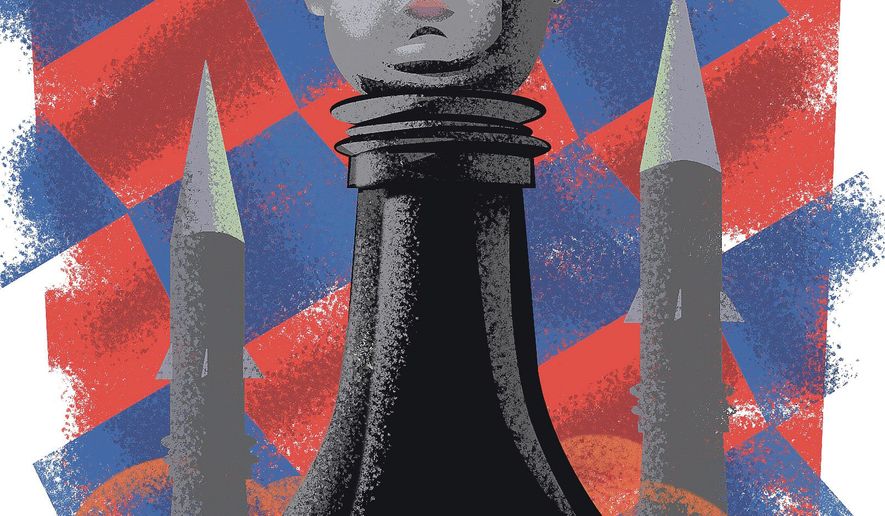OPINION:
At a time when the leader of North Korea is widely accused of ordering the murder of his half-brother, it is understandable that some in the Trump administration might want to keep their distance. But the decision announced a few days ago to cancel planned unofficial Track 1.5 talks in New York with the Pyongyang regime was a mistake. As someone who has participated in both formal Six Party negotiations and Track 1.5 talks, I can attest to the value of candid discussions with North Korea.
The United States has not had an engagement strategy for dealing with a nuclear North Korea since 2008. Perhaps because of the lack of such a strategy, and any formal talks, North Korea has blatantly defied the international community and built bigger nuclear bombs and missiles, while brutally eliminating any domestic opposition to its autocratic form of governance.
Kim Jong-un’s regime has built more plutonium and enriched-uranium nuclear weapons, capable of being miniaturized for missile delivery purposes, while developing mobile intermediate-range ballistic missiles (IRBM) and intercontinental ballistic missiles (ICBM) capable of reaching Guam and eventually the United States. This is an immediate existential nuclear threat to the region. Clearly, sanctions and international condemnation have not deterred North Korea from aggressively pursuing these threatening nuclear and missile programs.
Since the young leader, Kim Jong-un, took over in December 2011, North Korea has intensified its nuclear and missile programs, with four nuclear tests and more than 50 ballistic missile launches. Mr. Kim has also pursued an approach to domestic governance that relies on brutality and fear. The 2013 public humiliation of his uncle, Jang Song-thaek, and his execution (reportedly being fed to a pack of dogs), and now the public assassination of his half-brother, Kim Jong-nam, using an internationally banned VX nerve agent, are two of the more public displays of horrific brutality. The hundreds of less-publicized executions of senior- and mid-level officials are further proof that perceived disloyalty will be dealt with brutally.
What can the international community do about this irrational regime? China’s recent decision to suspend all imports of coal from North Korea until the end of the year is a welcome development. The move translates into denying North Korea over $1 billion of revenue, so sorely needed for its nuclear and missile programs. Hopefully, the United Nations Security Council will also impose additional sanctions on North Korea, in response to the February launch of a mobile, solid-fuel intermediate-range ballistic missile.
North Korea’s apparent lack of concern about China’s reaction to the removal of Mr. Kim’s uncle and half-brother is astonishing. Both men were close to China, with Jang Song-thaek routinely visiting Beijing, often with Kim Jong-un’s father, former leader Kim Jong-il, and speaking openly about the need for North Korea to learn from China’s bold economic reforms. The fact that Kim Jong-nam lived in Macao and Beijing and often referred to China’s successful economic reforms as a model for a North Korea in need of economic reforms was proof that he and Jang Song-thaek shared a friendship for China that troubled Kim Jong-un.
Kim Jong-un’s New Year’s pronouncement that North Korea will launch an ICBM in 2017, followed by a February launch of a mobile, solid-fuel IRBM, during the visit of Japanese Prime Minister Shinzo Abe to Washington, was a clear message to the United States and others that North Korea plans to move forward with its nuclear and missile programs, regardless of sanctions.
There should be no light between the U.S. and China on a policy for dealing with North Korea. The most immediate concern should be the North’s nuclear and missile programs. They have to be stopped. For the past five years we have been negligent in not working harder and more creatively in getting North Korea to halt these programs.
Of great concern is the possibility that North Korean nuclear weapons or components or know-how can be sold or given to bad state or non-state actors. Nuclear proliferation has to be one of our most important concerns, knowing that terrorist organizations reportedly have attempted to acquire weapons of mass destruction (WMD). In that context, North Korea’s use of the VX nerve agent has to intensify our concern about a WMD, whether nuclear, chemical or biological, getting into the hands of a terrorist organization.
Now what? As ugly as North Korea’s actions have been, it is folly to pretend they will go away if we ignore them. It’s time for China and the United States, with South Korea, to meet formally, ideally in Beijing, with seniors from North Korea to determine if it’s possible to halt North Korea’s nuclear and missile programs. In exchange, the U.S, South Korea and China should be prepared to talk about a peace treaty with North Korea to end the 67-year-old Korean War. On the table could be a discussion of the upcoming joint military exercises between the United States and South Korea and the possibility of some form of sanctions relief, if North Korea halts these programs. Absent a formal dialogue along these lines, unofficial Track 1.5 talks with North Korea could prove useful in the interim.
Eventually, however, meeting with North Korea for official talks that initially include the United States, China and South Korea would be prudent and potentially productive. If North Korea refuses to attend or if it rebuffs all reasonable efforts to negotiate a halt to its nuclear and missile programs, then the onus is on the U.S. and China, with the support and involvement of South Korea, Japan and Russia, to draft a strategy for dealing with a belligerent nuclear North Korea.
• Joseph R. DeTrani is the president of the Daniel Morgan Graduate School of National Security. He is formerly a special envoy of negotiations with North Korea and director of the National Counterproliferation Center. The views are the author’s and not any government agency or department.




Please read our comment policy before commenting.